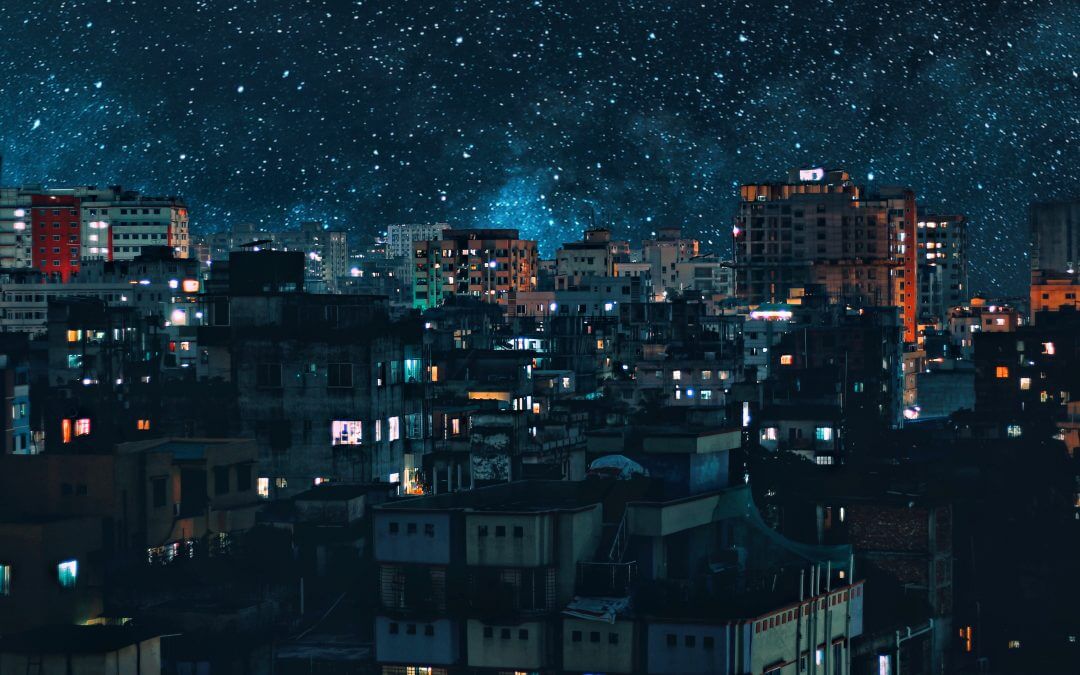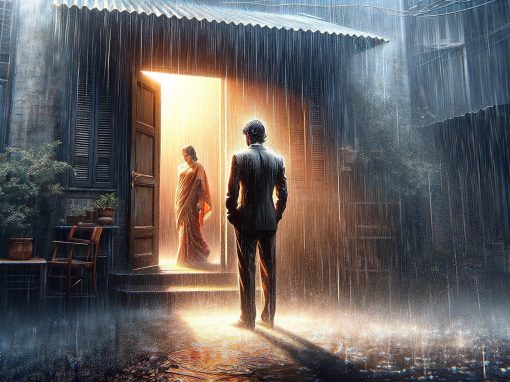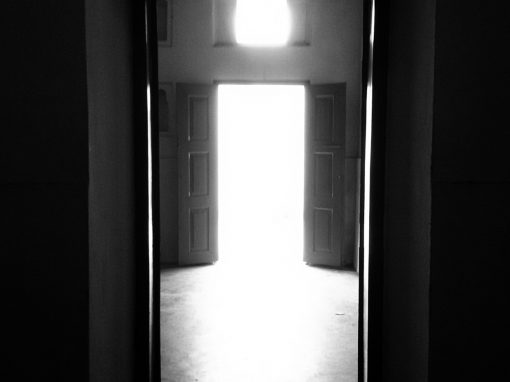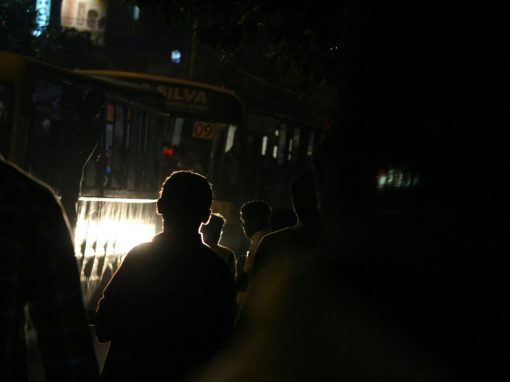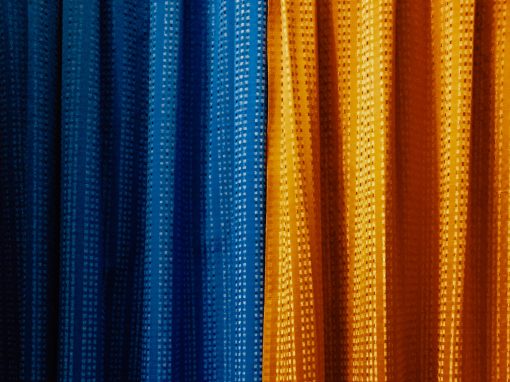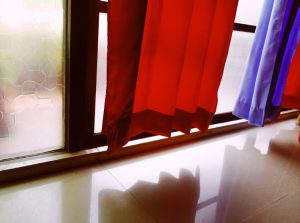
Someone at the Door
Shayira steps out of the shower, adjusting the drape of her sari*, a task not as simple as it seems. Special attention is required for the folds—when one fold clings to another, that’s when problems arise. It needs to be taut yet loose enough. As a child, playing with her mother’s sari, Shayira mastered the art. Her wet, waist-length hair is wrapped in a sky-blue towel, styled like her mother’s. While adjusting the sari, Shayira scrunches her nose. It’s raining outside, and the smell of the surrounding dirt comes alive, aggressively invading her nostrils.
The pungent smell of hilsa fish penetrates her nose, drifting in from the open window. She focuses on fixing her sari, annoyed that the maid had carelessly left the trash near the house when leaving. It’s very bothersome.
The doorbell rings, not a quick press but held down for a while before being released. Who could it be at this time? Did the maid forget to take yesterday’s leftover rice? But she doesn’t press the bell that way, nor does she tap it four times. Could it be Faysal? Why would he come now? He too presses the bell hastily, lacking patience for a prolonged ring. He taps only twice. But this was pressed slowly, only once, and nothing else. Did the neighborhood rogue, Bappi, ring the bell and run away? In this rain?
Lost in thoughts, Shayira walks to the door, the towel hanging loosely behind her. She wipes the water drops from her cheek with her hands and opens the door. It’s an old-fashioned door with a latch that makes a ‘thok’ sound when the latch falls. Rahat stands outside, dressed formally, his hair disheveled by the rain and south wind despite previously being neatly parted. His glasses remain the same. He wears a bright blue checkered shirt, typical of bankers. Shayira stands holding both sides of the door, braving the intensely cold and rude wind, feeling increasingly chilly, yet the sari stays perfectly in place, not even a bit of it slipping from her stomach. She has indeed mastered wearing it. However, Shayira’s stomach rumbles, and describing her heartbeat as elevated would be an understatement; it has slackened. Her eyebrows furrow like the folds on her forehead.
“Your house?” Rahat speaks with a mix of awkwardness and anxiety. “Yes,” Shayira replies, her beauty mark quivering above her lip. Rahat asks, “How are you?” “You’re here suddenly?” Shayira responds. Rahat, showing a file in his hand, explains, “Actually, there was a document to give to a gentleman named Faysal.” He reads the address on the file and confirms, “This is the address given here.”
“The name and address are correct,” Shayira confirms. The gusty wind intensifies, troubling not just Rahat but Shayira too, making it difficult to keep the door open. Rahat hands over the file to Shayira, who doesn’t take it immediately, suggesting, “You can’t leave now. Come inside.” Rahat enters, and Shayira closes the door.
“Sit,” she says. “Thank you,” Rahat replies, settling onto a single sofa. Shayira finally composes herself after a long five years since they last met. A lot has changed over the years, their perceptions altered. According to scientific research, if you don’t see a loved one for six months, their face starts to fade from your memory, becoming more pronounced after a year, and intensifies over time. Five years is a long time. Even though their faces had faded from memory, seeing each other for a few seconds brought everything back to both of them.
“Faysal is my husband,” Shayira reveals. “Oh,” Rahat reacts.
– “What’s in the file?”
-“He had applied for a loan a while back.” Shayira flips through a few pages of the file and asks, “Is it done?”
-“No, there are some corrections needed. He needs to do them. That’s why I came to give him the file,” Rahat explains.
-“So, you’re in the loan department?”
-“No, actually, I shouldn’t even be the one giving this file. My junior, Abu, was supposed to give it. I don’t work in this branch; I’m based in Chittagong. I was here for some work today. Abu is very close to me. He was extremely busy, so I thought since I was passing by, I’d help reduce his load.”
-“So, your helpful nature hasn’t gone away?”
-“It’s because of that nature that we met today, after five years.”
-“Didn’t you say you’d never meet me?”
-“Hmm. Did you want that?”
-“Maybe. Want some tea?”
-“No, I have a flight in an hour. I’ll have lunch once I’m back in Chittagong.”
-“How will you travel in this rain?”
-“I have a car with me.”
-“Why don’t you have lunch here before you go?”
-“Whenever I came over before, I never did have lunch.”
-“But every time you came, there was rice pudding in the fridge. I’ll bring it.”
Rahat starts to refuse, but Shayira doesn’t listen and walks towards the dining area, leaving him behind. Rahat looks around, noticing how meticulously the old house has been decorated. A large TV is on the wall, surrounded by several sofas; the dining area is right next to it. The kitchen is visible from there, and perhaps the bedroom across from it. On the left, past the main door, seems to be another room—maybe a balcony, just as Shayira had wanted. A question arises in Rahat’s mind. Is there a staircase leading to the upper floor or to the roof, exactly as Shayira had hoped for?
Shayira returns with rice pudding and falooda*, along with two fried fish. “Fried fish?” Rahat smiles, “Your favorite. And look, coincidentally, I fried them today”, Shayira replied.
-“Did you make the rice pudding and falooda yourself?”
-“Yes.”
Rahat tastes them and remarks, “It’s just like your mother’s. She must have taught you well before sending you to your in-law’s house.” After tasting the falooda, he comments, “You’ve reduced the sweetness. Did you forget how to make falooda?”
-“No, actually Faysal doesn’t like too much sweetness. So, I had to change the style a bit.”
“Okay,” Rahat replies.
Shayira has taken off her towel; her hair, still damp, is lightly curled. Her appearance seems even more radiant and fulfilled. It’s clear that Shayira is doing well. She has everything. Yet, no one’s life is entirely complete. Missing Rahat might be the only thing left unfulfilled.
“How’s the fried fish?” Shayira asks.
-“Excellent. Fried perfectly on a low flame.”
-“Looks like I managed to please you then.”
-“Can I ask a question?”
-“Go ahead.”
-“Is there a balcony next to your kitchen?”
-“How did you guess?”
-“You always wanted it that way, so I wondered if you got it.”
-“Yes, I did.”
-“Does the staircase go up to the roof?”
-“No, my parents used to live upstairs. They passed away two years ago.”
-“Then that wish remains unfulfilled.”
-“Does every wish get fulfilled?”
-“No.”
-“But past the upper floor is the roof.”
-“How many plants are there on the roof?”
-“Lots of plants. They hadn’t been cared for in a while. The rain has been good for them.”
-“Hmm.”
-“Tell me about yourself. When did you get married?”
-“How did you know I was married?”
-“Aren’t you?”
-“Yes, I am.”
-“What’s her name?”
-“Snigdha.”
-“Wow, what does she do?”
-“She works at a newspaper in Dhaka.”
-“Do you two live apart? No chance for kids then.”
-“Hahaha, we manage between visits. You two live together. No kids yet?”
-“We’ll have them. You first.”
Rahat laughs. The rain has lessened. “I need to go. My flight time is almost here.”
Shayira says, “Didn’t you have a fear of flying?” Rahat smiles lightly, “I was also scared of losing you. And I did lose you.” Shayira abruptly says, “After so long, there’s still resentment towards me.”
-“Maybe the resentment is against time,” Rahat says.
-“Did we do nothing wrong?”
-“I never even thought about falling in love, with you, yet I fell in love suddenly. You fall for me too. Where’s the fault?”
-“I don’t know.”
-“I came today; will you tell your husband?”
-“Why wouldn’t I?”
-“Does he know about us?”
-“Does your wife?”
-“Yes, she knows.”
-“Stay a bit longer. I’ve made tea.”
-“I can’t today. I’m already late.”
-“Alright. I’m coming.”
Shayira collects the plates and goes inside to turn off the stove, coming out just as Rahat has stood up near the door. Shayira opens the gate, and Rahat says, “Do you remember what I hated most when we met?” “Saying goodbye,” Shayira replies. “Still do. Take care.” Rahat gets into a car waiting nearby. Shayira says, “Stay well. Allah Hafez.” A slight smile appears on Rahat’s face as the car starts to move in the chilly air, the car’s AC running. Inside, Rahat clenches his teeth against the cold, unable to keep his eyes dry. A tear moistens the corner of his eye.
Shayira, having closed the gate, goes back inside. Rahat’s file, which he left behind, remains on the table. She picks it up and carries it to her bedroom without even opening it, laying it on the bed. Then she opens the top drawer of her filing cabinet and pulls out another file, bringing it over to compare with the one left by Rahat.
Opening the first page of Rahat’s file, Shayira notices a black ink streak next to the bank’s name, resembling a light scratch. She then opens the first page of the file from the cabinet, finding a similar mark next to the bank’s name in the same manner. As she flips through both files, the text, figures, and margins are exactly the same. A wry smile crosses her face.
The loan document had been delivered to her home from the bank a few days earlier. Shayira had received it herself. When Rahat gave her the file today, she knew it was the same file. She knew Rahat hadn’t come to deliver any file. He had come just to see her. Throughout Rahat’s visit, Shayira was aware of all this. Yet, she said nothing. Why would she? She too had wanted to see him, especially hoping he would wear his favorite blue checkered shirt. Why would she speak up? Shayira herself had wanted them to get soaked in the rain together, even if just standing at the door like strangers.
The city was again drenched. At the corner of the street, the road was flooded, the rain had eased. People began to emerge from their homes. Raindrops formed on the blurry windowpane, marking the slow passage of the afternoon into evening. The table remained set with food, now cold and ignored. The dal* had lost its flavor from the cold. The rice was still as white as intended. The chairs remained empty. The plants on the roof hadn’t wanted to be soaked this much. The veranda next to the kitchen, with all its old chairs and tables, seemed to be breathing slowly, damp from the rain. Alone in the dishwasher, a plate lay just as isolated. The tea was ready, but it wasn’t poured into the favored cup. The drape of the sari remained as orderly as life itself. The cushion on the single sofa lay askew. Just as the hair began to dry, the doorbell rang. In hope of opening the door once more, the doorbell chimed again. It rang perhaps in expectation of the person Shayira always hoped to see.
*Sari: “Principal outer garment of women of the South Asian subcontinent, consisting of a piece of often brightly coloured, frequently embroidered, silk, cotton, or, in recent years, synthetic cloth five to seven yards long. It is worn wrapped around the body with the end left hanging or used over the head as a hood.”
*Dal: “A South Asian dish, dal, paruppu, or pappu are dried, split pulses that do not require soaking before cooking.”
*Falooda: “A falooda is a Mughalai cold dessert made with vermicelli. It has origins in the Persian dish faloodeh, variants of which are found across West, Central, South and Southeast Asia.”

